Check string for nil & empty
Is there a way to check strings for nil and \"\" in Swift? In Rails, I can use blank() to check.
I currently have this, but i
-
SWIFT 3
extension Optional where Wrapped == String { /// Checks to see whether the optional string is nil or empty ("") public var isNilOrEmpty: Bool { if let text = self, !text.isEmpty { return false } return true } }Use like this on optional string:
if myString.isNilOrEmpty { print("Crap, how'd this happen?") }讨论(0) -
I would recommend.
if stringA.map(isEmpty) == false { println("blah blah") }mapapplies the function argument if the optional is.Some.
The playground capture also shows another possibility with the new Swift 1.2 if let optional binding. 讨论(0)
讨论(0) -
I know there are a lot of answers to this question, but none of them seems to be as convenient as this (in my opinion) to validate
UITextFielddata, which is one of the most common cases for using it:extension Optional where Wrapped == String { var isNilOrEmpty: Bool { return self?.trimmingCharacters(in: .whitespaces).isEmpty ?? true } }You can just use
textField.text.isNilOrEmptyYou can also skip the
.trimmingCharacters(in:.whitespaces)if you don't consider whitespaces as an empty string or use it for more complex input tests likevar isValidInput: Bool { return !isNilOrEmpty && self!.trimmingCharacters(in: .whitespaces).characters.count >= MIN_CHARS }讨论(0) -
This is a general solution for all types that conform to the
Collectionprotocol, which includesString:extension Optional where Wrapped: Collection { var isNilOrEmpty: Bool { self?.isEmpty ?? true } }讨论(0) -
When dealing with passing values from local db to server and vice versa, I was having too much trouble with ?'s and !'s and what not.
So I made a Swift3.0 utility to handle null cases and i can almost totally avoid ?'s and !'s in the code.
func str(_ string: String?) -> String { return (string != nil ? string! : "") }Ex:-
Before :
let myDictionary: [String: String] = ["title": (dbObject?.title != nil ? dbObject?.title! : "")]After :
let myDictionary: [String: String] = ["title": str(dbObject.title)]and when its required to check for a valid string,
if !str(dbObject.title).isEmpty { //do stuff }This saved me having to go through the trouble of adding and removing numerous ?'s and !'s after writing code that reasonably make sense.
讨论(0) -
Use the ternary operator (also known as the conditional operator,
C++ forever!):if stringA != nil ? stringA!.isEmpty == false : false { /* ... */ }The
stringA!force-unwrapping happens only whenstringA != nil, so it is safe. The== falseverbosity is somewhat more readable than yet another exclamation mark in!(stringA!.isEmpty).I personally prefer a slightly different form:
if stringA == nil ? false : stringA!.isEmpty == false { /* ... */ }In the statement above, it is immediately very clear that the entire
ifblock does not execute when a variable isnil.讨论(0)
- 热议问题

 加载中...
加载中...